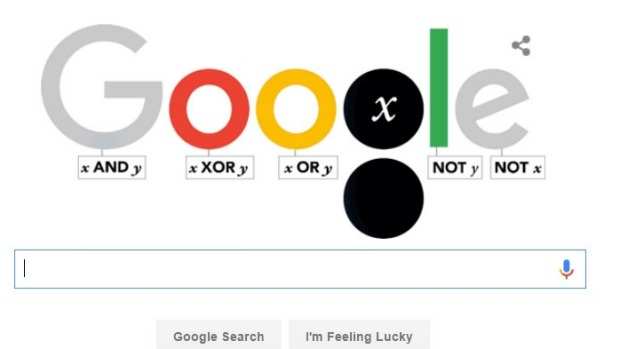In perhaps one of its best doodles till date, Google has designed it in the form of a Boolean algebraic code to honor British mathematician, logician and philosopher, George Boole, whose work is credited with laying many of the foundations for the digital revolution.
On his 200th birthday, Google wants us to know how Boole's intelligence back in the 19th century helped him devise "a new kind of mathematics" that we continue to use even today. His legacy was a system of logic that aimed to classify complex thoughts and codify it into simple algebraic equations - known today as Boolean logic - a theory of mathematics in which all variables are either "true" or "false", or "on" or "off". He mixed his Boolean logic with binary language to produce the combinations that now allow computers to operate and is used in almost all modern programming languages. It has completely transformed the lives of human beings as it underpins all modern day digital devices.
GeorgeBoole.com, a University College Cork website dedicated to him reads: "His legacy surrounds us everywhere, in the computers, information storage and retrieval, electronic circuits and controls that support life, learning and communications in the 21st century. His pivotal advances in mathematics, logic and probability provided the essential groundwork for modern mathematics, microelectronic engineering and computer science."
GEORGE BOOLE'S INSPIRING LIFE:
The Englishman was born on November 2, 1815 in Lincoln. A largely self-taught child prodigy, he never attended university and was forced to leave school at 16 years of age after his father's shoe business shut. He became an assistant teacher the same year and opened his own school when he was 20. Four years later, he published his first paper, Researches on the Theory of Analytical Transformations in the Cambridge Mathematical Journal.
Six years later, in 1847, he published his first book The Mathematical Analysis of Logic, where he introduced the concept of "symbolic logic" where mathematical symbols are used to represent classes or sets of objects, and the symbols are manipulated through mathematics.
In 1849, he was appointed the first professor of mathematics at Queen's College, Cork (now University College Cork (UCC)) in Ireland. He then expanded on his theory in his 1854 magnum opus An Investigation of the Laws of Thought, which according to the University College Cork website "extended his exploration of symbolic logic to probability theory, and originated a new concept, mathematical probability".
Boole died of pneumonia in 1864, when he was 49 years old, after he walked two miles through cold rain and then lectured wearing his wet clothes.
On his 200th birthday, Google wants us to know how Boole's intelligence back in the 19th century helped him devise "a new kind of mathematics" that we continue to use even today. His legacy was a system of logic that aimed to classify complex thoughts and codify it into simple algebraic equations - known today as Boolean logic - a theory of mathematics in which all variables are either "true" or "false", or "on" or "off". He mixed his Boolean logic with binary language to produce the combinations that now allow computers to operate and is used in almost all modern programming languages. It has completely transformed the lives of human beings as it underpins all modern day digital devices.
GeorgeBoole.com, a University College Cork website dedicated to him reads: "His legacy surrounds us everywhere, in the computers, information storage and retrieval, electronic circuits and controls that support life, learning and communications in the 21st century. His pivotal advances in mathematics, logic and probability provided the essential groundwork for modern mathematics, microelectronic engineering and computer science."
GEORGE BOOLE'S INSPIRING LIFE:
The Englishman was born on November 2, 1815 in Lincoln. A largely self-taught child prodigy, he never attended university and was forced to leave school at 16 years of age after his father's shoe business shut. He became an assistant teacher the same year and opened his own school when he was 20. Four years later, he published his first paper, Researches on the Theory of Analytical Transformations in the Cambridge Mathematical Journal.
Six years later, in 1847, he published his first book The Mathematical Analysis of Logic, where he introduced the concept of "symbolic logic" where mathematical symbols are used to represent classes or sets of objects, and the symbols are manipulated through mathematics.
In 1849, he was appointed the first professor of mathematics at Queen's College, Cork (now University College Cork (UCC)) in Ireland. He then expanded on his theory in his 1854 magnum opus An Investigation of the Laws of Thought, which according to the University College Cork website "extended his exploration of symbolic logic to probability theory, and originated a new concept, mathematical probability".
Boole died of pneumonia in 1864, when he was 49 years old, after he walked two miles through cold rain and then lectured wearing his wet clothes.

0 comments:
Post a Comment